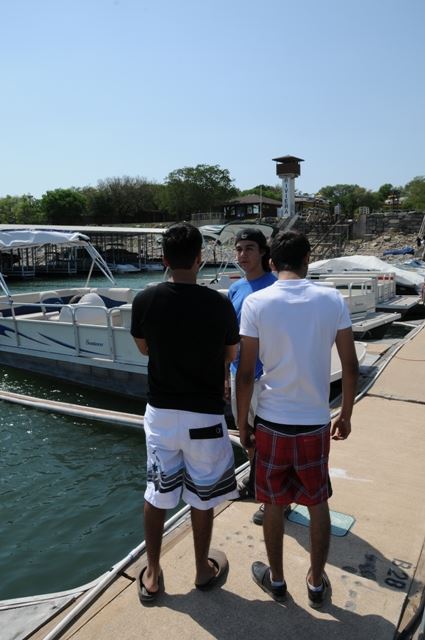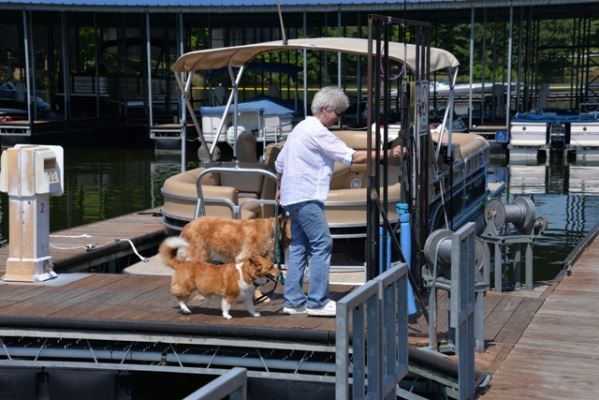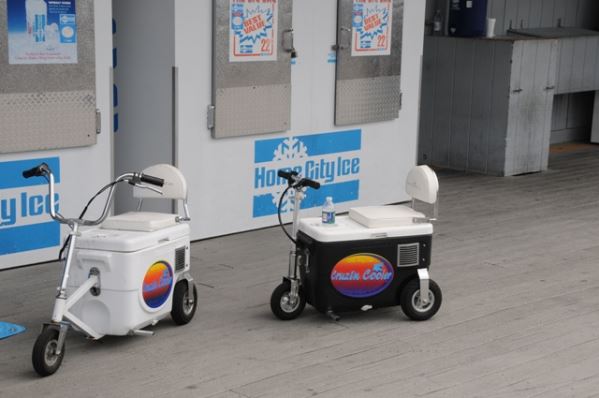
Do You Have Dock Etiquette?
Have you ever been walking down the dock to your pontoon, and there right in the middle of the main walkway is a pile of stuff from someone else’s boat? You look around and don’t see them anywhere, just their stuff. In addition, you can’t get your own dock cart of boating supplies (along with the dog, ukuleles and the cooler) past the “dock block” without moving something. Here’s a question: should you move someone else’s stuff?
Guess this might bring up a bigger topic…dock etiquette.
Let me clarify: I am not the greatest at etiquette. Just in the last few years, I learned about holding your hands up in front of the table setting, the left hand looks like a small “b” for bread, and the right hand looks like a small “d” for drinks. This newfound knowledge has saved me a number of times from messing with someone else’s drink. However, in the grand scheme of etiquette, I needed to look up the definition.
Which is, “A code of behavior that delineates expectations for social behavior according to contemporary conventional norms within a society, social class, or group.”
 If I have this right, the group is “boaters on my dock” and the social behavior I am looking for is “What’s the correct behavior on my dock?”
If I have this right, the group is “boaters on my dock” and the social behavior I am looking for is “What’s the correct behavior on my dock?”
There are a couple of twists to this. If someone, like a property owner, owns the dock on a lake, it is not my dock and the owner can set the rules. That’s pretty straightforward.
But what about those of us who rent a slip on a dock at a marina? My dock has pontoons, wakeboard boats, sailboats and more. Each has a different set of operating ideas and etiquette. There are basic dock rules as stated by the marina, but there are lots of people who do things way different than me. I am not saying their way is wrong, but it’s not what I would do and I wish they wouldn’t do it that way. But, that’s just me, so is there a correct way?
 But, a couple boats down, the owners decided they don’t even care where the extra line goes, so it ends up on the dock often where your dock cart wheels have to run over it. I don’t know about you, but I have been found coiling other people’s lines, for safety reasons, to keep them out of the way.
But, a couple boats down, the owners decided they don’t even care where the extra line goes, so it ends up on the dock often where your dock cart wheels have to run over it. I don’t know about you, but I have been found coiling other people’s lines, for safety reasons, to keep them out of the way.
And there is this new trend on the docks that is some kind of a “daisy chain” looping process, which does shorten the extra line, but the stiffer straight-line of excess rope is even harder to get your dock cart over. I do use the same looping process for extension cords at home. It makes it a lot easier to pull one end and it doesn’t get tangled, but it still gets in the way on the docks.
Then there are the loading/unloading piles. You have probably all seen this before. Walking to your boat, there in the middle of the dock is a pile of coolers, clothes and kids. The boat owners are on the boat, cleaning, covering and doing whatever else they need to do before the get on or off. But in the meantime the dock is full blown LA traffic-jammed. I’m not saying I don’t do the same kind of thing sometimes, but I do try and leave a passing lane.
 One other thing that kind of gets me: I’m out on the water and when I get back to my slip the boater next to me has loaded up the docks with chairs and coolers, making it difficult for us to step off our boat safely.
One other thing that kind of gets me: I’m out on the water and when I get back to my slip the boater next to me has loaded up the docks with chairs and coolers, making it difficult for us to step off our boat safely.
Guess this makes me sound like I am one of those old “crotchety” guys trying to keep the kids off my dock, but believe me I’m not. I just wish everyone who used the docks thought about other people using the dock and left room, or picked up after themselves etc.
*This article is courtesy Pontoon and Deck Boat Magazine. It is written by Scott "Sky" Smith. For this and more, visit pdbmagazine.com
- Mindy Goodman
- Tags: bad boating habits Boating boating etiquette docking

Boating Etiquette Makes for Smooth Sailing
Typically, boating is a fun, relaxing activity. But occasionally situations arise that cause tension - between boaters, or between boaters and homeowners on the shore, or dock owners. Thankfully a little etiquette can go a long way to helping diffuse these situations or even avoiding them altogether.
One of the most common issues arises when boaters get too close to docks, other boats or shorelines. This issue is compounded when the boater is going too fast, or displays a disrespectful attitude when other boaters, or home/dock owners, point out the problem.
As the captain of the ship, the best thing you can do in these situations is be respectful and try to correct whatever the behavior is that has caused frustration. If at all possible, just move on, away from the area. If you do end up speaking to the party that’s frustrated, stay calm. Be polite. Do your best to diffuse the situation.
Loud music and loud boats can also be frustrating, especially for homeowners. Remember that sound carries over water, so if the music is loud to you, it’s loud on shore, too. It’s also a safety hazard for the driver, who may not be able to hear everything he or she needs to - so turn the music down. If your boat is very loud, try to avoid repeatedly going past the same area of shoreline. The homeowners will appreciate it.
Depending on where you boat, frustrated property owners could limit your access to the water if they feel boaters aren’t respectful or following the rules of the waterway. To try to keep issues from arising in the first place, follow these rules of thumb:
- Stay at least 150 feet from docks and shorelines
- Obey “No Wake” zones
- When other boats are near, slow down.
- Amy Cabanas
- Tags: Boating boating etiquette polite boating respectful boating rude boaters
